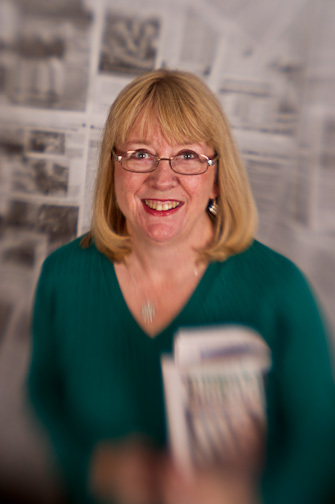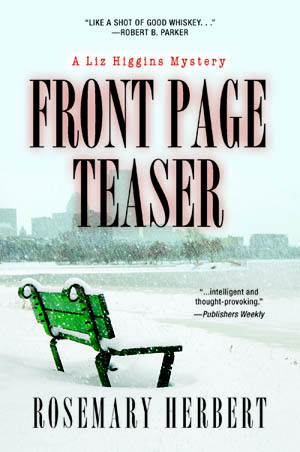Rosemary Herbert first knew she wanted to be a mystery writer in the fourth grade.
At the time, she was devouring Nancy Drew books. The urge to write mysteries stayed with her through her school years, motherhood and lots of jobs that came close to her dream but never quite got there.
She was a reference librarian at Harvard University and spent 10 years as a features writer and book review editor for the Boston Herald. She was editor-in-chief of “The Oxford Companion to Crime & Mystery Writing” and worked with famed mystery writer Tony Hillerman on “A New Omnibus of Crime.”
Herbert finally wrote her first mystery, “Front Page Teaser” (Down East Books, $14.95), in what she calls “a year of Sundays.” She was working at the Boston Herald at the time, doing some freelancing on the side, and she was a single mother to three daughters.
The book’s heroine, Liz Higgins, is a tabloid reporter at a Boston newspaper called the Beantown Banner who has been relegated to soft news and is itching to take on a hard news story. Set at Christmastime, “Front Page Teaser” follows Higgins as she digs into the case of a missing woman.
“I finally realized that I was not a person with a trust fund,” Herbert says of her decision to finally write the book. “I was never going to have the luxury of time. And being a journalist had taught me to know that I could write no matter what was going on. I could write, I thought well, in limited amounts of time. And if I set myself a deadline to write a book, I probably could do it.”
Herbert lived in Thomaston for five years, working as the publicity director for Down East Books, magazine and online. She now makes her home on the North Shore of Boston, but hopes that eventually she’ll once again spend her summers in Maine.
Q: You’ve worked with some great mystery writers. What made you decide to write a mystery yourself?
A: I had a teacher in the fourth grade called Miss Obre, and she had us write a book, she called it. We wrote our book out on pages and illustrated our plots with our own hand-drawn illustrations. Then we sewed these pages together with needle and thread, and covered them with our father’s shirt cardboard from the cleaners, covered in fabric and bound with something like electric tape.
My book was a mystery called “The Mystery of the Mansion,” about a missing grandmother and a missing diamond and what I called a brooch. It was very imitative of Nancy Drew, which I was in those days reading with a flashlight under the covers, which any girl with spunk did. But I had wanted to become a writer ever since I first learned to read because I just thought it was magic when I saw the letters that I couldn’t read turn into words that I understand. For some reason, I realized very keenly that someone had written those words in the book that was in my lap. I didn’t even know who that person was, and it didn’t matter. I knew what they meant to say, and it thrilled me. I wanted to be the person who did that. It was a very big gift of life.
Q: What was the impetus for you to say, “I’m going to do this?”
A: I think I always knew I would, that I would be disappointed in myself and my life if I did not. But there was a specific impetus, too. I was doing just what you’re doing right now. I was interviewing Mary Higgins Clark about one of her latest books some years ago, and in my pushy journalistic way I asked her what her numbers were on her latest contract. For a number of books she had a multimillion-dollar contract, and I remember thinking, well, I’m in the wrong business.
I actually did love working in the newsroom, which I think comes across in my book. I loved it. But I still also wanted to write a mystery. Mary had known me for some years from mystery conferences and other interviews, and she knew that I had wanted to write a mystery myself. And she said, “When are you writing that mystery?” And I said, “Oh Mary, I’ve got three girls, I’m freelancing, I’ve got a full-time job,” all those things. And she said, “Rosemary, you’ve just got to do it.”
I got off the phone with the combination of the tantalizing idea of maybe making some money, maybe not millions, but some money from the book, and also that encouragement from someone whose career I admired and who took the time to urge me in her busy life, to be concerned about me and my progress. I remember walking around the newsroom feeling almost a little bit lightheaded and thinking, you know, I’ve just got to do it.
And so I went home that very week, and I sat down when I had a small amount of free time, and I just said where can I carve out the time to do this? I realized that my kids tend to sleep late on Sundays. They usually didn’t need to be driven as many places, and I could get up before them and get a good block of writing in, a good few hours. I found that what I could do was I could write from about 7 in the morning until 7 at night, and that’s what I did. Now, I also in that time made meals, got them to places if they needed to, helped with homework, all of that, but generally it wasn’t as heavy a schedule of that kind of stuff on Sundays.
Q: When you worked at the Boston Herald, were you like Liz Higgins? Did you want to cover hard news?
A: The way I’m like Liz is, I think that I have the same kind of spunk and doggedness and earnestness that she has. I’d like to think I’m just as good at making wisecracks and that sort of thing. The way I’m not like her is I don’t have her beautiful head of wavy auburn hair.
My experience at the Boston Herald did include doing some really amusing, shall we say, assignments. Some of them were really pretty light. One, I had to oversee a contest of the most kissable lips. But mostly at the Herald, when I started there I was in an entry-level editorial assistant position and I did everything from career profiles to inputting recipes in a column called “Just Desserts” to taking some wedding announcements. But I also, even though I had the entry-level work like that, I also was immediately named the garden destination writer and I wrote about garden destinations across New England, and I did some general features. Unlike Liz, I worked with editors who were supportive of my growth, and thanks to that I became the book review editor when they saw my strength in that area.
I didn’t have to fight to get front-page news. In fact, if I came across front-page news I could call it in. If I was on the scene, I could report on something, and if another reporter then came then that reporter might take over. But they never discouraged me from anything.
Q: Newsrooms have changed so much. When you were writing this, did it feel a bit like a tribute to an old friend?
A: When I was writing it, I did realize as I was doing it that I was essentially writing a love song to the news reporting life, and now as I look at it I realize that the moment that I captured, which was while the newsroom was still filled with people and at its height of staffing and excitement, I think I’ve captured a moment that we no longer have in the way a newsroom can be. I hope it’s not going to become an elegy to a lost way of life. I hope that newsrooms will find their way.
You know, the tradition of mystery writing has always been, from its early days in the golden age of the 1920s and ’30s, to give readers not just a perplexing and fast-paced read, but also to give them entree into a different world. That could be into a country house, into an ocean liner, into ancient Egypt ruins, whatever it may be. And what I really wanted to do was to give my readers an entree into the newsroom experience — the whole world of it, the feel of it, the tension and pace and everything else that’s in there.
Q: What was it like working with Tony Hillerman?
A: First of all, I learned that he was not only a talented writer of fiction but (also) that he really knew the genre well. He was a tremendous help and support in making sure that our anthology reflected good taste and a broad knowledge of the genre, even while we were trying to put in entertaining stories.
In the “New Omnibus of Crime,” our mission was to take a look at detective fiction that had been published since Dorothy L. Sayers’ landmark book, “The Omnibus of Crime.” It was published in the late 1920s. And our goal was to look at detective fiction since then, through representative, entertaining stories, to show innovations that have happened in the genre over those years. And what I learned from Tony that helped with my own writing was he told me a very good tip about how to get the readers to actually experience a sense of suspense when you need a moment like that. He told me that I should put the reader into the body of the character by revealing everything that happens that is experience, to get into all five senses of the character so that you hear what the character hears, you touch what the character touches, you taste what the character tastes, etc. That’s how you get the reader to actually experience the suspense. Of course, you can also do that by making the reader feel invested in the well-being of the character by identifying with the character to a large extent. And he was also very supportive and encouraging, of course. He hoped that I would get a novel written, and he was thrilled for me when I did.
Q: Are you working on a new book? What can you tell me about it? Are you planning another Liz Higgins mystery?
A: Yes, I do plan another Liz Higgins novel. I actually have about three more plots in mind for her in a general way, and some of the characters who are in the book “Front Page Teaser” will appear again.
Staff Writer Meredith Goad can be contacted at 791-6332 or at:
mgoad@pressherald.com
Copy the Story Link
Send questions/comments to the editors.





Success. Please wait for the page to reload. If the page does not reload within 5 seconds, please refresh the page.
Enter your email and password to access comments.
Hi, to comment on stories you must . This profile is in addition to your subscription and website login.
Already have a commenting profile? .
Invalid username/password.
Please check your email to confirm and complete your registration.
Only subscribers are eligible to post comments. Please subscribe or login first for digital access. Here’s why.
Use the form below to reset your password. When you've submitted your account email, we will send an email with a reset code.